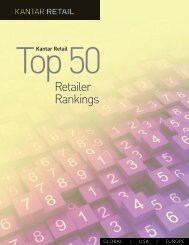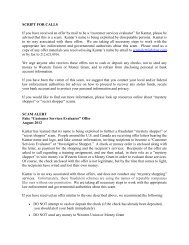The Future Shopper March 2013.pdf - Kantar Retail
The Future Shopper March 2013.pdf - Kantar Retail
The Future Shopper March 2013.pdf - Kantar Retail
Create successful ePaper yourself
Turn your PDF publications into a flip-book with our unique Google optimized e-Paper software.
loyalty, experience and value<br />
[as discussed earlier in the<br />
report].<br />
One of the things that pureplay<br />
online retailers can do<br />
more easily than brick and<br />
mortar ones is to create very<br />
disruptive, fast-moving price<br />
points. So we’re going to see<br />
a lot more retailers move<br />
toward more personalized<br />
and tailored propositions<br />
which are delivered outside of<br />
the public domain. Shopping<br />
across all retail outlets is<br />
going to be faster; it’s going<br />
to be more aimed at your<br />
personal preferences; it’s<br />
going to be more fun where it<br />
makes sense; and the value<br />
proposition is going to be more<br />
personal, more targeted and<br />
more private.<br />
Looking toward 2020 from a<br />
shopper point of view, what<br />
is the biggest change we’ll<br />
experience as shoppers?<br />
I’d say that it will be an<br />
integration of the digital<br />
and physical world, in ways<br />
that are in some cases<br />
fairly predictable and, in<br />
others, difficult to imagine.<br />
‘Everywhere-commerce’ is<br />
going to be the underpinning<br />
of what we see. You’re going<br />
to see more businesses<br />
figure out how to get more<br />
digitally integrated yet<br />
tangible propositions in<br />
front of shoppers in far<br />
more interesting ways. True<br />
integration of the digital and<br />
physical world is going to come<br />
from retailers who may only<br />
have a few products in stock,<br />
but have a three-dimensional<br />
rendering of the rest of the<br />
catalog that you can view and<br />
have delivered to your home<br />
even before you get back. If I’m<br />
Michael Kors, and I’m thinking<br />
about how to sell handbags, it<br />
would be much easier if I could<br />
have a kiosk where I physically<br />
stocked my five most popular<br />
handbags, and if my customer<br />
wants something different<br />
or a variation, I can provide a<br />
digitized mirror so they can<br />
see how it would look, and<br />
have it delivered later that<br />
day. <strong>The</strong>re’s no reason in the<br />
world why you couldn’t sell<br />
$2,000 handbags out of a<br />
sophisticated digital vending<br />
machine.<br />
What’s not going to change?<br />
I suspect that there’s still<br />
going to be places that you can<br />
functionally go and buy stuff<br />
that’s going to be delivered on<br />
a low-cost operating platform.<br />
<strong>The</strong>re’s always going to be an<br />
element of transaction-driven<br />
retail where the shopper<br />
is going to be able to buy<br />
something simply without a<br />
lot of bells and whistles. <strong>The</strong><br />
story of retail since the Second<br />
World War is that those models<br />
keep on getting better at<br />
replicating the things that<br />
premium retailers do.<br />
<strong>The</strong> job of the retailer that<br />
wants to maintain its margins<br />
is to keep reinventing and<br />
reconfiguring the levers of<br />
shopper value in ways where<br />
they can extract higher than<br />
commoditized margins. <strong>The</strong><br />
re-imagination of consumer<br />
value in the context of your<br />
brand proposition is the core<br />
strategic challenge on the<br />
table for anyone who’s trying<br />
to win in this future shopping<br />
world.<br />
Interview by Andrew Curry<br />
18<br />
<strong>The</strong> <strong>Future</strong> <strong>Shopper</strong>












